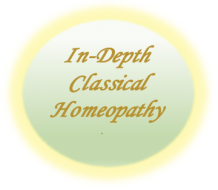The Art and Science of Homeopathy
Jane Tara Cicchetti, RS Hom,(NA), CCH
What makes homeopathy different than other forms of natural healing? The key is in the name. It is derived from the Greek word homoios, meaning like. Homeopathy is based on the principle of like cures like , also known as the law of similars, which means it works by using a little bit of something that can cause the problem to cure it. For example, if you peel an onion your eyes become very teary. A homeopathic preparation of red onion, Allium Cepa, is used for colds or allergies where the sufferer has teary eyes.
The art of homeopathy is the ability to apply the law of similars to find the correct remedy. If the law of similars is applied accurately the remedies act swiftly and thoroughly, if not, nothing happens and one has done no harm. It is this process of matching symptoms that makes a treatment homeopathic, not the remedies per se.
Although the principle of the law of similars has been known for several thousand years, homeopathy, in its present form was discovered 200 years ago by a German physician, Samuel Hahnemann. He found that by using specially prepared remedies made from very dilute amounts of herbs, minerals or animal extracts he could utilize the healing power of the law of similars safely and effectively with no side effects. He carefully documented 200 remedies- writing down exactly what each remedy was able to cause and cure. Today we have almost 2000 homeopathic remedies, each as carefully studied as Hahnemann’s original ones.
Every homeopathic remedy must be tested or proven before it is allowed to become part of the homeopathic pharmacy. This proving of homeopathic remedies, was and still is conducted on people, not animals. It is done in a very specific way so that those testing the remedies improve rather than harm their health. In the United States, homeopathic remedies are regulated by the FDA, in conjunction with a committee representing the Homeopathic Pharmacopoeia of the United States.
Now widely recognized as a safe and effective alternative to conventional medicines, homeopathy is in general use throughout the world. It is used in France and Germany and is the treatment of choice of the royal family of England. Used and endorsed by Mahatma Ghandi, Mark Twain, Charles Dickens, Wolfgang Goethe, Pope Pius X and even Mary Baker Eddy, founder of Christian Science , this unique form of medicine was widely practiced in the United States up until the early part of the twentieth century. In l900 there were 22 homeopathic medical schools and over 100 homeopathic hospitals across the country.
After the turn of the century, homeopathy fell out of favor in the United States due to pressures from the AMA, the discovery of sulfa drugs, and the changes in consciousness after the industrial revolution. These changes lead to thinking about the body as a machine made up of unrelated parts. Because of this we are experiencing chronic diseases that are not responding to antibiotics, homeopathy, with its consideration of the individual as a whole is coming back into favor in this country.
Homeopathy offers treatment for acute infectious disease as well as chronic disease, emotional disorders and injuries. Excellent for children and infants as well as adults, it works by stimulating the body and mind to heal naturally. It does not kill germs, but allows our own defense mechanisms to strengthen the body so that it can throw off the infection. This natural healing system can be learned for self-treatment of colds, flu, injuries, and other acute problems by taking a class in acute homeopathy. Most people who study homeopathy find it fascinating as well as very effective and useful.
The best way to receive homeopathic treatment for chronic disease or for prevention is to see a well-trained practitioner of homeopathy. He or she will give an intensive interview lasting about two hours before deciding on the remedy that is just right for the individual. This remedy, which is sometimes known as the constitutional remedy, stimulates healing on the level of mind, body and emotions.
People often ask what kinds of chronic problems and diseases can be helped with homeopathy. It is important to remember that homeopathy treats people not diseases. One person with a particular disease, say arthritis, may be easily helped with homeopathy, another may not have such positive effects or be very difficult to treat. This has to do with many factors unique to the individual such as the amount of allopathic drugs she is taking, family health history and her ability to perceive and report her symptoms to the homeopath. An understanding of homeopathy and what information the practitioner needs to find the correct remedy may improve the results.
As you can see, homeopathy is a complex art and science. The more you know about it, the more it can help you. There are many good books available to assist you in your understanding of this healing art. Two that I suggest for beginners are: Discovering Homeopathy: Medicine for the 21st
Century by Dana Ullman and Homeopathic Medicine at Home by Maesimund B. Panos and Jane Heimlich. The Science of Homeopathy by George Vithoulkas is a good book for in depth study of the laws and principles of homeopathy.

